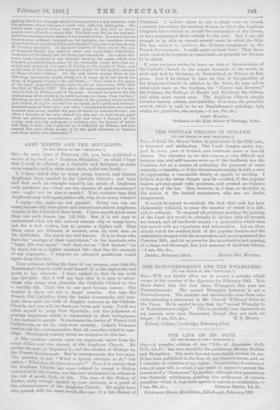ABBE MARTIN AND THE RITUALISTS.
[TO TUE EDITOR OF THE “SPROTATOR."1
• Sm„—In your issue of February 5th, you have published a review of my book on "Anglican-Ritualism," on which I hope that I shall be allowed, as a Catholic and foreigner, to make some remarks, and to state some facts, under two heads :— 1. I have asked why so many pious, learned, and zealous Anglicans have seceded to the Catholic Church ; and have :said that such an example raised in the minds of Anglicans such questions as,—what are the reasons of such accessions? :and,—onght not we also to secede P Your reviewer says that Anglicans may with equal justice ask, why do so many remain ?
reply,—tho cases are not parallel. Every one can see in any reasons why even pious and learned and zealous Anglicans remain in the Church of their birth. I have myself given more than one such reason (pp. 122-160). But it is not easy to -understand what are the natural reasons why so many leave, not for a bad motive, but to pursue a higher call. That these cases are different is avowed, even by such men as Dr. Littledalo. His words are well known. It is in those who have the "courage of their convictions," in the hundreds who 4' begin life over again"—and that, not as "fast laymen" (as he says), but in a higher spiritual life—that lies the strength of any argument. I suppose no educated gentleman would again deny this fact.
Your reviewer, feeling the force of my reasons, says that the Established Church could avail herself of a like argument, and point to her converts. I have replied to this in my work '(pp. 224.226). But I will say here that it is easy to under- stasis' why many Men abandon the Catholic Church to live :a worldly life. That lies in our poor human nature. The -wonder is there are not a larger number. But take the French Old Catholics, from the leader downwards, and com- pare them with the bulk of English converts to the Catholic -Church, and you will see there are 'verts and 'verts. I will not .allow myself to judge Pitre Hyacinth ; but the judgment of average Anglicans, which is represented in their newspapers, I am content to accept. It condemns the leader of French Old 'Catholicism, as we do, only more severely. Indeed, Erasmus used to tell his contemporaries, that all comedies ended in mar- riage. Theological comedy seems no exception to this law.
_2. The reviewer retorts upon my argument taken from the
• conga d'etire and the slavery of the Anglican Church. He quotes the acts of Napolemi I., and. the election of Bishops by the French Government. But he misrepresents the two cases. The question is not, " What a tyrant attempts to do," but rather, " What does the Church accept ?" Now, it is certain that the Anglican Church has never refused to accept a Bishop nominated by the Crown, nor has ever maintained its refusal at the risk of goods, limb, or life. The ease of the Bishop of Exeter, oddly enough quoted by your reviewer, is a proof of the submissiveness of the Anglican Church. He might have also quoted, with the mine result, the case of a late Bishop of Hereford. I believe there is not a single ease on record, certainly not within the memory of man, in which the Anglican Chapters have refused to accept the nomination of the Crown, or have maintained their refusal to the end. But I am old enough to be able to record-several cases in which the Holy See has refused to institute the Bishops nominated by the French Government. I could quote at least four. That these cases cannot be frequent is conceivable, on grounds too obvious to be stated.
If your reviewer wishes to have an idea of the resistance of the Catholic Church to the unjust demands of the world, he need only look to Germany, to Switzerland, to France, to Bel- gium. And if he wishes to have an idea of the pliability of the Anglican Church in relation to the State, lie may call to mind such cases as the Gorham, the "Essays and Reviews," the Colenso, the Bishops of Exeter and Hereford, the Clifton, and other more recent ones. The Anglican Church simply tolerates heresy, schism, and infidelity. It is true, she grumbles over it, which is said to be an Englishman's privilege; but, whilst she grumbles, she accepts.—I am, Sir, &c.,
ABBE MARTIN, •
Professor in the High School of Theology, Paris.


































 Previous page
Previous page